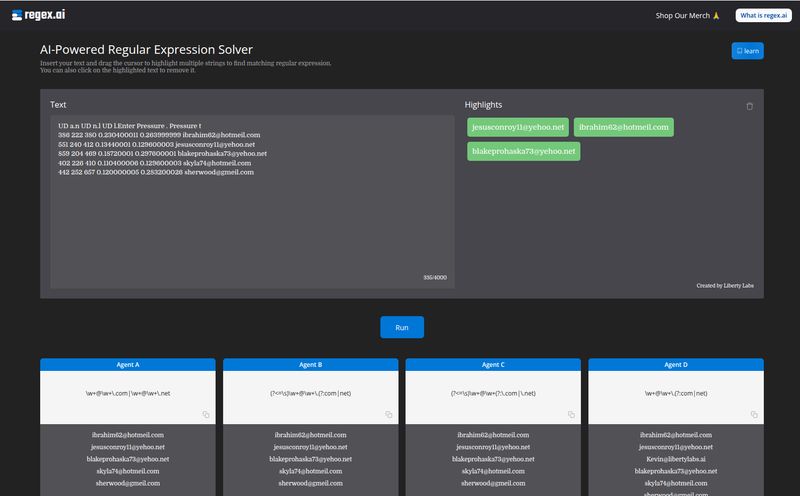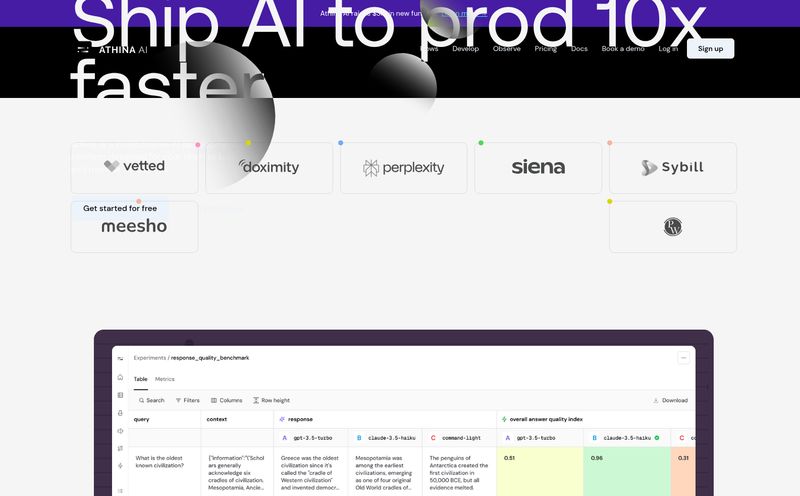We're all using AI. If you're a developer and you tell me you haven't pasted a gnarly function into ChatGPT with a desperate plea of 'what is WRONG with you?!', you're either a superhero or you're lying. It's an incredible tool for untangling logic, writing boilerplate, and even getting a second opinion on a tricky bug. It’s like having a senior dev on call 24/7 who never gets tired of your questions.
But there's always that little voice in the back of your head, right? That nagging feeling. 'Should I be sending this code... out there?' Especially when it's not some random snippet from a tutorial. I’m talking about the secret sauce. The proprietary algorithms, the client's confidential logic, the stuff that pays the bills. Sending that to a third-party service feels a bit like shouting your bank password in a crowded room. You just don't do it.
For a while, the trade-off seemed clear: speed and convenience vs. security and privacy. You couldn't have both. And then I stumbled across a tool called ObfusCat, and I gotta say, my curiosity was piqued. The promise? All the help of ChatGPT, with none of the exposure. A tall order.
What Exactly is ObfusCat, and Why Should I Care?
So what is this thing? At its core, ObfusCat is an AI code assistant that acts as a privacy bodyguard for your code. Think of it like this: before you send your code to ChatGPT for help, ObfusCat steps in and puts a mask on it. It jumbles up the meaningful parts—your variable names, function names, specific strings—into nonsense. The crucial thing is, it leaves the structure, the syntax, completely intact.

Visit ObfusCat
It’s like writing a letter in a secret code. The postman (ChatGPT) can still see the sentence structure, the punctuation, the grammar. It can tell you if a paragraph is well-formed or if you've used a run-on sentence. But it has no idea that you’re actually discussing the plans for your top-secret new project. It can help you with the form of your code without ever knowing the function.
After ChatGPT works its magic on the masked version, the response comes back to your machine, and ObfusCat takes the mask off, translating everything back to your original code. The most important part of this whole dance is that your raw, proprietary code never leaves your local machine. It’s a pretty clever solution to a very modern developer problem.
The Good Stuff: Where ObfusCat Really Shines
The main benefit is obvious: keeping your secrets, secret. In a world where a company's intellectual property can be its most valuable asset, this is huge. You can get help refining a critical piece of business logic without worrying that you're training an AI model on it or that it might be retained somewhere you don't control. It's about peace of mind, which is something you can't really put a price on.
But it's more than just a privacy guard. Because it removes that risk, it opens up ChatGPT for so much more. You can throw complex, real-world bugs at it. You can ask it to help you write comprehensive unit tests for sensitive functions. You can even ask it to explain a legacy piece of spaghetti code you inherited without feeling like you’re committing corporate espionage. It simply makes the AI a more viable and integrated part of a professional workflow. The promise of easy integration means it shouldn't get in your way, it just becomes part of the process.
Let’s Be Real: The Potential Downsides
Now, I'm a professional, but I'm also a cynic. No tool is perfect. And ObfusCat has a few things you should be aware of. First, there's likely some initial setup. It’s probably not a one-click-and-go solution for every single environment. You might have to fiddle with some configuration to get it playing nicely with your setup. A bit of a pain? Maybe. A dealbreaker? Probably not for the security it offers.
There's also the performance question. The process of masking and unmasking code takes processing power. It's a local operation, which is great for privacy, but it does add a step. Will you notice a delay? Maybe a fraction of a second. On a massive codebase, perhaps it's more significant. It's a classic trade-off: a little bit of speed for a lot of security.
And finally, its effectiveness is not absolute. The creators are upfront that it depends on the complexity of the code. If your code is already a masterclass in obfuscation (and not in a good way), the tool might struggle to separate the syntax from the semantics cleanly. It's not a magic bullet, it's a tool that requires a reasonably well-structured input to give you a good output.
What's the Damage? A Look at ObfusCat's Pricing
Naturally, the next question is, "What's this going to cost me?" So, I went to find their pricing page to get the details for you. And… well, the page seems to be on a coffee break. I got a 'Sorry, the requested page could not be found.' message.
This happens. Maybe they're updating it, maybe it's a temporary glitch, or maybe they’re still figuring out the pricing model. If I were to guess, I'd imagine we might see a freemium model with some limitations, or a tiered subscription for individuals and teams. A one-time purchase could also make sense for this kind of utility. For now, we’ll have to wait and see. It does add a little mystery to the whole thing, doesn't it?
So, Who Is This Tool Really For?
I can see a few people's eyes lighting up right now. If you're a developer at a large company with an infosec department that has a heart attack every time someone mentions a new cloud service, this could be your new best friend. It gives you the power of AI while adhering to strict IP policies.
If you're a freelancer, handling sensitive code from multiple clients, this is a no-brainer. It's a professional way to protect your clients' data while still being as efficient as possible. And if you're a solo founder, pouring your heart and soul into a new app, this is your shield. It lets you use cutting-edge tools to build your dream without risking it before you even launch.
ObfusCat vs. The 'I'll Just Change Variable Names' Method
Some of you might be thinking, "Pfft, I can do that myself. I'll just find-and-replace `user_api_key` with `VAR_1`." And yes, you can. I've done it. I remember spending 20 minutes manually 'sanitizing' a function once, only to forget which variable was which and getting a completely useless response from the AI. Never again.
The difference is in the sophistication. ObfusCat's algorithm is designed to understand the semantic context and conceal it, while perfectly preserving the syntactic structure. It's not just a dumb find-and-replace. It’s an intelligent process that understands what can be changed without breaking the code's logic from the AI's perspective. It saves you the manual labor and, more importantly, the mental overhead.
Frequently Asked Questions about ObfusCat
Does ObfusCat send my code to its own servers?
From everything I've read, no. The entire obfuscation and de-obfuscation process happens on your local machine. That's the whole point. The only thing sent to an external service is the masked, anonymized version of your code.
Will ObfusCat work with any programming language?
In theory, it should work with most text-based languages where the syntax is the primary concern for the AI (like Python, JavaScript, Java, C#, etc.). However, its effectiveness might vary. I'd recommend checking their documentation (once it's available!) for a specific list of supported languages.
Is this 100% foolproof?
Let's be realistic: no security tool is 100% foolproof. This is about risk mitigation, not risk elimination. It provides a powerful, intelligent layer of protection that makes it incredibly difficult, if not impossible, for the AI to understand the proprietary nature of your code. It's a massive step up from sending raw code.
How is this different from other privacy tools for AI?
Many privacy tools focus on enterprise-level controls, like private hosting of models or network-level data loss prevention (DLP). ObfusCat is different because it's a developer-first tool focused on the specific workflow of sending code snippets for analysis. It's more of a targeted, personal privacy shield than a massive corporate firewall.
Can I use ObfusCat with AI models other than ChatGPT?
Plausibly, yes. Since the tool works by transforming the text before you send it, you should be able to paste the obfuscated code into any AI chat model, like Claude or Gemini, and then manually de-obfuscate the response. Official integrations might be limited to ChatGPT initially, but the core functionality should be model-agnostic.
The Final Verdict
So, is ObfusCat the answer to every developer's privacy prayers? It's a very, very strong contender. It addresses a real, tangible pain point that has only grown as AI tools have become more powerful and integrated into our work.
It’s not perfect, and there are some unanswered questions, especially around the pricing and performance on truly massive files. But the concept is sound, and the execution seems to be focused on the right things: local processing, intelligent masking, and developer workflow.
In the constant balancing act between innovation and security, ObfusCat feels like a tool that puts a heavy thumb on the security side of the scale without forcing you to give up on the cool new toys. And for that reason, it's something I’ll definitely be keeping in my digital toolbox.
Reference and Sources
- To learn more about the tool itself, you can try and find their official website. (The one I found had a broken pricing link, but hopefully that's fixed soon!)
- For a broader discussion on AI and intellectual property concerns, articles from publications like TechCrunch provide excellent background context on why tools like ObfusCat are becoming so necessary.



